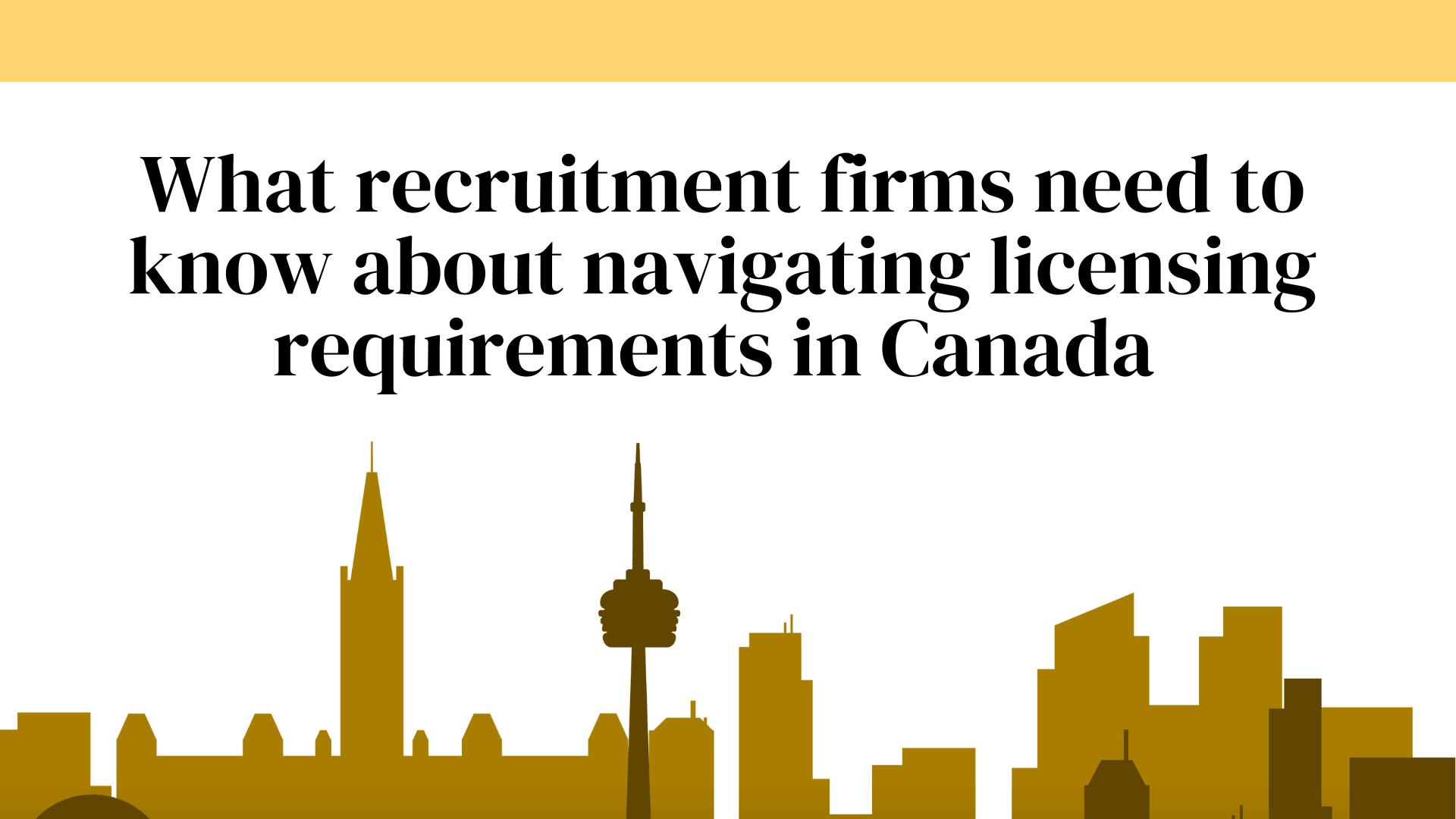Unlike countries with centralized employment laws, Canada’s employment and recruitment regulations are governed at the provincial level, meaning compliance requirements can vary widely depending on where your clients or candidates are located.
One of the most important, yet often overlooked, areas is licensing for recruitment and staffing firms. Whether operating in Canada, working with Canadian clients, or placing Canadian candidates – even without a Canadian entity – you will need to be licensed depending on the province. Even if you think you don’t need a licence, make sure to check. Otherwise, you could be putting not only yourself at risk but also your clients. Employers are also liable if they work with recruitment firms that don’t hold a licence.
In today’s post, we break down which regions require a licence, who needs one, and what regulations apply, so your business can operate confidently and compliantly across Canada.
Who Needs a Licence?
Recruitment licensing laws in Canada don’t just apply to domestic agencies. You may need to be licensed if you:
- Place candidates who live in Canada, even if your firm is based outside the country.
- Work with Canadian clients looking to hire permanent, contract, or temporary talent.
- Have a legal entity in Canada and offer any type of recruitment or placement services.
Ultimately, the licensing requirement applies to anyone acting as a “recruiter.” A “recruiter” is defined broadly to include any individual, sole proprietor, corporation, or partnership that engages in the business of finding – or attempting to find – employment opportunities for job seekers or locating potential employees for businesses.
Provincial Licensing Requirements: A Regional Breakdown
Here’s how recruitment licensing requirements vary across the provinces.
Ontario
Working for Workers Act, 2021 (and 2023 Amendments)
Under the Employment Standards Act, 2000, Ontario now requires licences for:
- Temporary help agencies
- Recruiters
This includes recruitment firms that place candidates for temporary and/or permanent roles and firms that work remotely but serve Ontario clients or candidates.
Key requirements:
- Apply for a recruiter licence through the Ontario Ministry of Labour, Immigration, Training and Skills Development
- Undergo criminal record checks
- Provide financial security (e.g., an irrevocable letter of credit)
- Renew licence annually
Employers are prohibited from knowingly using unlicensed recruiters or agencies.
Quebec
Act Respecting Labour Standards
In Quebec, staffing agencies that assign workers to clients – both permanent and temp hires – are required to be licensed by CNESST.
Requirements:
- Maintain an office in Quebec or designate a local representative
- Submit financial documentation
- Comply with workplace standards and reporting requirements
British Columbia (BC)
Temporary Foreign Worker Protection Act
BC requires licensing for anyone recruiting or employing temporary foreign workers, including staffing agencies and recruiters.
- Firms must register with the Employment Standards Branch
- Applies even to firms outside British Columbia if placing foreign workers into British Columbia-based jobs
- Employers must also use only licensed recruiters
Alberta
Fair Trading Act & Employment Agency Business Licensing Regulation
Alberta requires a business licence for recruitment firms that recruit temporary foreign workers into the province. It also requires a licence for firms that provide employment agency services, such as job matching or candidate placement.
Businesses must:
- Apply through Alberta’s Consumer Services
- Disclose all international recruitment activity
- Maintain specific business conduct standards
Manitoba
Worker Recruitment and Protection Act
Manitoba has some of the most robust licensing requirements. Any agency or individual recruiting foreign workers must be licensed.
Requirements:
- Recruiters must be licensed by the Employment Standards Division
- Employers must register before hiring foreign workers
- Only work with licensed recruiters to avoid penalties
Non-compliance can result in significant fines and bans from hiring foreign workers.
Other Specific Licence Requirements
Not all provinces require specific recruitment licences, though general business registration and employment compliance still applies:
- Saskatchewan (You may need a licence for recruiting foreign workers)
- Nova Scotia (No licence required)
- New Brunswick (If you are recruiting foreign workers, it’s likely you’ll need to be licensed by Labour Standards before you can recruit them.)
- Newfoundland and Labrador (You may need a licence for recruiting foreign workers)
- Prince Edward Island (You may need a licence for recruiting foreign workers)
Common Pitfalls Recruitment Firms Should Watch Out For
As licensing is provincial rather than federal, you shouldn’t assume a Canadian entity covers all provinces.
Don’t overlook remote placements. If the candidate or the employer is in a regulated province, you may still need a licence. In Ontario and Manitoba, employers are legally responsible for ensuring they work with licensed recruiters.
Canada’s recruitment licensing landscape is complex and rapidly evolving. Licensing is far from just a formality, it’s a legal requirement that can impact your operations. Non- compliance can lead to fines of up to $15,000 for first conviction, depending on your province. If you’re working with Canadian talent or clients, make sure licensing is part of your compliance playbook.
Partnering up with an experienced EOR can help you keep on top of the legal complexities of international recruitment. Get in touch with our team today.




